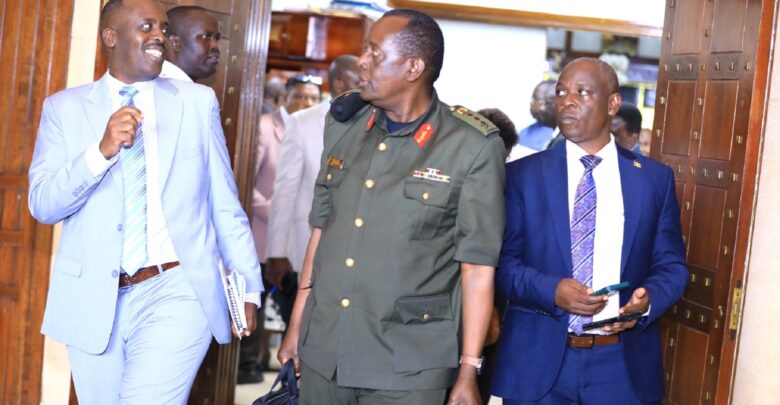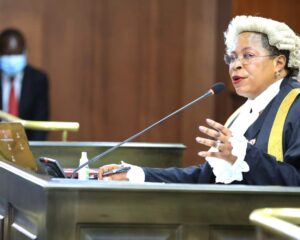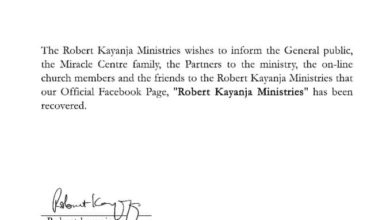Uncategorized
UPDF Amendment Bill sails through
Parliament has passed the Uganda Peoples’ Defence Forces (Amendment) Bill, 2025, that will see civilians tried in the court martial.

Parliament has passed the Uganda Peoples’ Defence Forces (Amendment) Bill, 2025, that will see civilians tried in the court martial.
The bill introduces sweeping reforms to the military justice system, restructures health services for armed forces personnel, and streamlines veterans’ affairs. It establishes a Directorate of Military Prosecutions to professionalize the process.
It also protects against premature execution of a death sentence until it is confirmed by the Supreme Court.
Additionally, the Bill sets out a clear apparent process for court-martial decisions; from Unit Court Martial to the Division Court Martial, from Division Court Martial to the General Court Martial, from General Court Martial to the Court of Appeal, and finally to the Supreme Court.
Presenting the motion on Tuesday, 20 May 2025, in a plenary session chaired by Speaker Anita Among, the Minister of Defence and Veteran Affairs, Jacob Oboth Oboth, said that the Bill is not about subjecting civilians to military courts arbitrarily but targets those who engage in military-related offences.
“This law addresses civilians who acquire arms or equipment used for violence, those who masquerade as militants, and those who commit offences in collaboration with military personnel. I want to dispel fears that this law targets all Ugandans,” Oboth said.
“The committee has examined this matter and concludes that the trial of civilians by military courts should occur only in exceptional circumstances, ensuring that a fair trial is guaranteed.”
The Bill responds to the Supreme Court’s decision in Attorney General vs. Hon. Michael A. Kabaziguruka, Constitutional Appeal No. 2 of 2021, which found that the trial of civilians in military courts under the current UPDF Act was unconstitutional.
Kajwengye noted that the proposed changes require the restructuring of military courts to ensure independence and transparency.
“This requires changes to the military structure to ensure that those presiding over trials are appointed through a transparent process and operate independently of superior influence,” he added.
The bill introduces reforms relating to the structure, appointments, and jurisdiction of military courts.
However, the committee also raised several concerns.
“The roles and mandate of the Military Courts Department are vague, leaving gaps in oversight and accountability. This overlap of judicial and prosecutorial roles is a violation of natural justice,” Kajwengye said.
On judicial appointments, the committee recommended increased civilian oversight and the administration of judicial oaths, a proposal upheld by the House.
“The committee contends that military courts must be governed by the judicial oath and legal standards. Military court judges should be appointed by the Commander-in-Chief on the recommendation of the Judicial Service Commission from a list generated by the High Command.”
The committee further proposed that appeals from the General Court Martial should lie with the Court of Appeal.
Regarding military property, the committee recommended the regulation of military-style attire that lacks UPDF insignia, to distinguish it from civilian wear.
A minority report authored by Moses Okot (FDC, Kioga County) criticised the Bill as unconstitutional and contrary to the Supreme Court’s judgment.

Jonathan Odur (UPC, Erute County South), who also dissented, warned that the passing of the Bill will be remembered as a birth of military dictatorship.
“If Parliament passes this Bill, the day will be remembered as the birth of military dictatorship. This Bill is a direct assault on the Constitution and the rule of law. The Supreme Court was clear, civilians must not face military tribunals,” he argued.
He added: “Imagine a future where any civilian – opposition leader, activist, or journalist, can be dragged before a Court Martial. This is not the Uganda envisioned in our Constitution.”
Fox Odoi-Oywelowo (NRM, West Budama North East County) successfully moved a motion to suspend Rule 214(14), allowing debate on the matter to proceed.
During debate, Gilbert Olanya (FDC, Kilak South) demanded clarity from the Attorney General on what constitutes “exceptional circumstances” under which civilians can be tried by a military court.
The Minister of State for Sports, Peter Ogwang, criticised the narrow focus of the debate on civilian trials, arguing that the bill broadly enhances the welfare of the armed forces.

